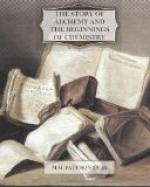The alchemists’ general conception of nature led them to assign to every substance a condition or state natural to it, and wherein alone it could be said to be as it was designed to be. Each substance, they taught, could be caused to leave its natural state only by violent, or non-natural, means, and any substance which had been driven from its natural condition by violence was ready, and even eager, to return to the condition consonant with its nature.
Thus Norton, in his Ordinal of Alchemy, says: “Metals are generated in the earth, for above ground they are subject to rust; hence above ground is the place of corruption of metals, and of their gradual destruction. The cause which we assign to this fact is that above ground they are not in their proper element, and an unnatural position is destructive to natural objects, as we see, for instance, that fishes die when they are taken out of the water; and as it is natural for men, beasts, and birds to live in the air, so stones and metals are naturally generated under the earth.”
In his New Pearl of Great Price (16th century), Bonus says:—“The object of Nature in all things is to introduce into each substance the form which properly belongs to it; and this is also the design of our Art.”
This view assumed the knowledge of the natural conditions of the substances wherewith experiments were performed. It supposed that man could act as a guide, to bring back to its natural condition a substance which had been removed from that condition, either by violent processes of nature, or by man’s device. The alchemist regarded himself as an arbiter in questions concerning the natural condition of each substance he dealt with. He thought he could say, “this substance ought to be thus, or thus,” “that substance is constrained, thwarted, hindered from becoming what nature meant it to be.”
In Ben Jonson’s play called The Alchemist, Subtle (who is the alchemist of the play) says, " ... metals would be gold if they had time.”
The alchemist not only attributed ethical qualities to material things, he also became the guardian and guide of the moral practices of these things. He thought himself able to recall the erring metal to the path of metalline virtue, to lead the extravagant mineral back to the moral home-life from which it had been seduced, to show the doubting and vacillating salt what it was ignorantly seeking, and to help it to find the unrealised object of its search. The alchemist acted as a sort of conscience to the metals, minerals, salts, and other substances he submitted to the processes of his laboratory. He treated them as a wise physician might treat an ignorant and somewhat refractory patient. “I know what you want better than you do,” he seems often to be saying to the metals he is calcining, separating, joining and subliming.
But the ignorant alchemist was not always thanked for his treatment. Sometimes the patient rebelled. For instance, Michael Sendivogius, in his tract, The New Chemical Light drawn from the Fountain of Nature and of Manual Experience (17th century), recounts a dialogue between Mercury, the Alchemist, and Nature.




